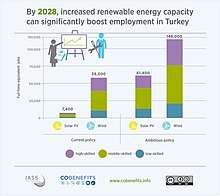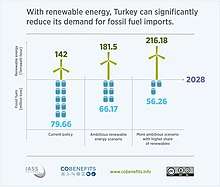Renewable energy in Turkey
Although there are plenty of renewable resources for energy in Turkey,[1] only hydropower has been much developed, averaging about a fifth of national electricity supply.[2] However because this is vulnerable to droughts less electricity than usual is from hydro in those recent years,[3] compared to around a third in a wet year.[4] The country is aiming for two thirds of electricity to be from renewables by 2023[5] but Turkey has invested less in solar and wind power than similar Mediterranean countries.[3] Turkey needs a renewable energy plan beyond 2023 which includes transport, industry, heating and cooling as well as electricity generation.[2] Turkey is a net exporter of wind power equipment but a net importer of solar power equipment.[6]
Solar energy
| Year | 2015 | 2017 | 2019 | 2023 |
|---|---|---|---|---|
| MW | 300 | 1,800 | 3,000 | 5,000 |
Solar energy potential in Turkey is 977,000 (TWh/year) from which 6105 (TWh/year) is technically possible. According to modelling[8] by Carbon Tracker new solar power became cheaper than new coal power in 2020, and will become cheaper than existing coal plants in 2023.[9]
Wind power
Wind energy technical potential is 290 TWh/year. According to another industry source the total installed power reached 5.789 GW by year end 2016 and the percentage of electricity consumption provided by wind power grew from under 1%, in 2009 to 5.59% by 2016 and is forecast to reach 12% of electricity consumption with the completion of planned facilities.[10] According to modelling[11] by Carbon Tracker new wind power became cheaper than new coal power in 2020, and will become cheaper than existing coal plants in 2027.[12]
Bioenergy
Biomass is also a major renewable energy resource in Turkey as the biomass economical potential of Turkey is 8.6 mtoe/year.[1]
Hydroelectricity
Many dams have been built throughout the country, and about 23GW of power can be generated by hydroelectric plants.[13] There are many projects currently in progress, such as the Southeastern Anatolia Project, which will allow generation of 15GW through hydroelectric energy.[14] Technical potential of hydraulic energy is 216 TWh/year and economical potential is 127.4 TWh/year.[1]
Geothermal power in Turkey
Turkey is ranked seventh richest country in the world in geothermal potential.[15] Turkey reaches milestone 1,100 MW of installed geothermal power generation capacity in December 2017. Turkey is fourth largest in the world in 2018 when it comes to installed capacity after United States.
Storage and integration
Increasing Turkey's proportion of electric cars in use to 10% by 2030 would help integrate variable electricity.[16]
Employment, industrial production, and balance of trade



60,000 people are employed as of 2020 and it is estimated employment could be boosted to 80,000 if rooftop solar is boosted.[17]
See also
- List of renewable energy topics by country
- Energy conservation#Turkey
References
- DAWOOD, KAMRAN (2016). "Hybrid wind-solar reliable solution for Turkey to meet electric demand". Balkan Journal of Electrical and Computer Engineering. 4 (2): 62–66. doi:10.17694/bajece.06954.
- "Lessons from global experiences for accelerating energy transition in Turkey through solar and wind power" (PDF). Shura. Retrieved 19 February 2019.
- Saygılı, Hülya. "RENEWABLE ENERGY USE IN TURKEY". CBRT blog. Retrieved 17 February 2019.
- "Turkish authorities aim to boost renewable power generation to 50 percent by 2023". Daily Sabah. 2018-08-24.
- "Turkey looks to raise share of renewables to two-thirds by 2023". Daily Sabah. 2019-06-17.
- "How Turkey Can Ensure a Successful Energy Transition". Center for American Progress. Retrieved 19 February 2019.
- "PVPS Annual Report 2015, p109".
- "GLOBAL COAL POWER ECONOMICS MODEL METHODOLOGY" (PDF).
- "WIND VS COAL POWER IN TURKEY/SOLAR PV VS COAL IN TURKEY" (PDF). Carbon Tracker. 2020.
- "Rüzgar Enerji Santralleri". Enerji Atlası (in Turkish). Retrieved 2017-12-01.
- "GLOBAL COAL POWER ECONOMICS MODEL METHODOLOGY" (PDF).
- "WIND VS COAL POWER IN TURKEY/SOLAR PV VS COAL IN TURKEY" (PDF). Carbon Tracker. 2020.
- "Turkey country profile". International Hydropower Association. Retrieved 2 March 2015.
- "Reaching for Turkey's Hydropower Summit". Hydroworld. Retrieved 2 March 2015.
- DAWOOD, KAMRAN (2016). "Hybrid wind-solar reliable solution for Turkey to meet electric demand". Balkan Journal of Electrical and Computer Engineering. 4 (2): 62–66. doi:10.17694/bajece.06954.
- "Transport sector transformation: Integrating electric vehicles into Turkey's distribution grids" (PDF).
- Agency, Anadolu (2020-03-11). "Solar rooftops expect to see 66% rise by year-end". Daily Sabah. Retrieved 2020-03-23.
Sources
- 2019-2023 Strateji̇k Plani (PDF) (Report) (in Turkish). Ministry of Energy and Natural Resources (Turkey). May 2020.
External links
![]()